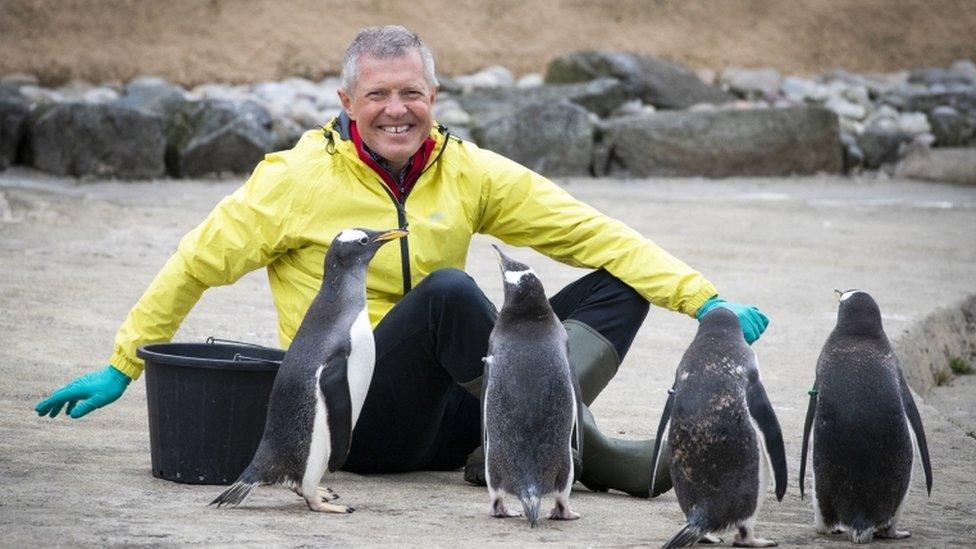Willie Rennie to stand down as Scottish Lib Dem leader
- Published
Willie Rennie told BBC Scotland: "I think it was right to consider the future after 10 years."
Willie Rennie is to step down as leader of the Scottish Liberal Democrats after 10 years in the job, saying it is time for fresh leadership.
The North East Fife MSP has led the party through eleven election and referendum campaigns since 2011.
However they were reduced to just four seats at Holyrood in May's vote.
Mr Rennie said the Lib Dems had "moved the debate and delivered change", but said it was "time for a fresh face" to take the party forward post-pandemic.
He said that while there had been "both gains and losses along the way", he had "enjoyed every effort".
The party's executive group is meeting on Monday evening to discuss the rules of the leadership election, with the aim of having Mr Rennie's successor in post by the time Holyrood's summer recess ends.
Only sitting MSPs can run as candidates, meaning there are only three possible successors - with Alex Cole-Hamilton seen by many as the favourite to take the job.

Mr Rennie developed a reputation for his colourful photo-calls on the election campaign trail
A former campaign manager for the party, Mr Rennie became an MP in 2006 after upsetting Labour in the Dunfermline and West Fife by-election.
Although he lost it again in 2010, he was elected to Holyrood the following year as a list MSP for Mid Scotland and Fife - and was swiftly elected Scottish Lib Dem leader after the resignation of Tavish Scott.
Mr Rennie then won the North East Fife seat from the SNP in the 2016 election, although the Lib Dems failed to make gains Scotland-wide and dropped into fifth place at Holyrood behind the Scottish Greens.
While he held his own seat with an increased majority in the 2021 contest, the Lib Dems fell to four seats in the Scottish Parliament.
Known for his colourful photo-calls during election campaigns, Mr Rennie announced his resignation via a YouTube video he recorded while climbing a hill, external.
Mr Rennie said the party had "championed the case for better mental health services, world class schools and investment for early years education" on his watch.

Mr Rennie announced his resignation as leader in a video from a hill top
He added: "Scotland deserves a strong progressive alternative to the twin nationalisms represented by the SNP and Conservatives.
"They polarise and divide Scotland when we should unite to overcome the enormous challenges we face, from Covid-19 to climate change to the inequalities that continue to stain our society.
"But it is time for a fresh face to lead our party forward. The new leader will have my full support in writing the next bright chapter of the Scottish Liberal Democrats' story."
First Minister Nicola Sturgeon was among those who paid tribute to Mr Rennie following the announcement, posting her "best wishes" on Twitter, external.
She said: "Despite our political disagreements, I've always respected his commitment and decency.
"Political leadership takes its toll and after ten years at the helm of his party, I'm sure he is looking forward to new challenges."
Scottish Conservative leader Douglas Ross said: "He's been leader through a rollercoaster decade in Scottish politics and I hope he gets to enjoy a lot more well-deserved time with family."
And Scottish Labour leader Anas Sarwar said Mr Rennie had led his party "with humour, positivity, energy and compassion", adding: "He is a good friend and an inspiration to all those that love a photo-op."


Willie Rennie's tenure as Lib Dem leader has been colourful, if nothing else.
In a decade littered with election campaigns, he has zip-wired, go-karted and helter-skeltered across Scotland with the appearance of a man having the absolute time of his life.
Despite these eye-grabbing stunts, Lib Dem fortunes have fluctuated - the party has taken a firm grip on a handful constituencies, but drifted into irrelevance in many others.
And the most recent contest has left it at arguably its lowest ebb, reduced to four seats at Holyrood - and thus no longer seen as an official party grouping. This costs the party representation on crucial parliamentary management groups, and opportunities to ask questions and table debates.
It also means the new leader will be chosen from a very select group. Alex Cole-Hamilton has made little secret of his ambition to someday take on the top job, and it would not be a surprise if he was in post by the time MSPs return from recess in September.